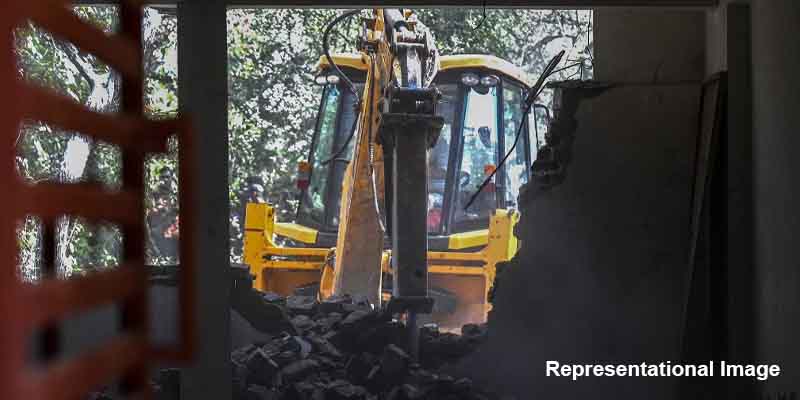- India
- Sep 03
- Kevin Savio Antony
SC questions ‘bulldozer justice’
• With several state administrations flattening the houses of those involved in criminal cases with bulldozers, the Supreme Court questioned how anybody’s house could be demolished just because he is an accused.
• The apex court said it will lay down the guidelines on the issue that would be enforceable across the country.
• Even if he is a convict, still it can’t be done without following the procedure as prescribed by law, the SC bench said.
• The Supreme Court, however, said it would not protect any unauthorised construction or encroachment on public roads.
• It posted the matter for further hearing on September 17.
How are such demolition drives problematic?
• In India, the ‘right to shelter’ is acknowledged as a Fundamental Right under the broader scope of the ‘right to life’, as enshrined in Article 21 of the Indian Constitution.
• This right guarantees every citizen access to adequate housing, which is deemed essential for living a dignified life. The ‘right to shelter’ goes beyond merely providing a roof over one’s head. It also encompasses adequate privacy, space, security, lighting, ventilation, basic infrastructure, and proximity to workplaces and social amenities.
• Therefore, forced evictions without proper rehabilitation and adherence to due process are considered violations of this Fundamental Right.
International Covenant on Economic, Social and Cultural Rights
Article 11.1: States Parties to the present Covenant recognise the right of everyone to an adequate standard of living for himself and his family, including adequate food, clothing and housing, and to the continuous improvement of living conditions. The States Parties will take appropriate steps to ensure the realisation of this right, recognising to this effect the essential importance of international co-operation based on free consent.
• Under the International Covenant on Economic, Social, and Cultural Rights (ICESCR), the rights recognised can only be restricted by states if such limitations are prescribed by law in a way that is consistent with the nature of these rights and are intended solely to promote the general welfare of society.
• However, any restrictions imposed on rights, such as the right to adequate housing, must not result in the destruction of those rights.
• This principle is explicitly outlined in Article 5 of the ICESCR.
International Human Rights Law Framework
• Article 25 of the Universal Declaration of Human Rights covers a wide range of rights, including those to adequate food, water, sanitation, clothing, housing and medical care, as well as social protection covering situations beyond one’s control, such as disability, widowhood, unemployment and old age. Mothers and children are singled out for special care.
• Furthermore, international law prohibits arbitrary interference with an individual’s right to property. For example, Article 12 of the Universal Declaration of Human Rights (UDHR) asserts that “no one shall be subjected to arbitrary interference with his privacy, family, home or correspondence, nor to attacks upon his honour and reputation”. It also provides that “everyone has the right to the protection of the law against such interference or attacks”. This underscores the importance of safeguarding individuals’ rights to privacy and property against unjust actions.
International Covenant on Civil and Political Rights
• Article 17 of the International Covenant on Civil and Political Rights (ICCPR) states no one shall be subjected to arbitrary or unlawful interference with his privacy, family, home or correspondence, nor to unlawful attacks on his honour and reputation.
• Everyone has the right to the protection of the law against such interference or attacks.
Related SC judgements on the issue
1) Olga Tellis & Ors vs Bombay Municipal Corporation & Ors (1985): In its judgment, the apex court ruled that forcibly evicting pavement dwellers without giving them an opportunity to be heard is unconstitutional, as it violates their right to livelihood. This decision reinforces the importance of due process and fair treatment in actions affecting an individual's fundamental rights.
2) Maneka Gandhi vs Union of India (1978): In this landmark case, the Supreme Court expanded the interpretation of Article 21 of the Constitution, stating that “due process of law” is an essential component of the “procedure established by law”.
• The SC emphasized that any legal procedure must be fair, just, and reasonable.
• If the procedure is found to be whimsical, oppressive, or arbitrary, it should not be regarded as a legitimate procedure under Article 21, thereby failing to satisfy its constitutional requirements.
3) Municipal Corporation, Ludhiana vs Inderjit Singh (2008): In this case, the Supreme Court explicitly stated that if a municipal law requires a notice to be given before any action, such as demolition, this requirement must be strictly followed.
• The SC made it clear that authorities cannot proceed with demolitions, even of illegal constructions, without first providing notice and allowing the occupant an opportunity to be heard.
• The Supreme Court, in cases such as Bachan Singh vs State of Punjab (1980), Vishaka vs State of Rajasthan (1997), and more recently in Puttaswamy vs Union of India (2017), has consistently held that the Fundamental Rights guaranteed under the Constitution must be interpreted in a way that aligns with international human rights law. This approach ensures that India’s constitutional rights evolve in harmony with global human rights standards.
(The author is a trainer for Civil Services aspirants.)

